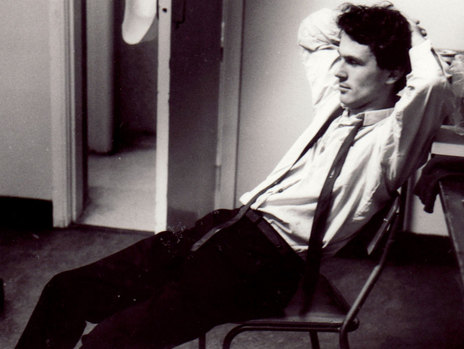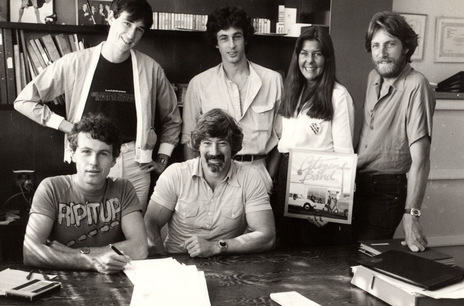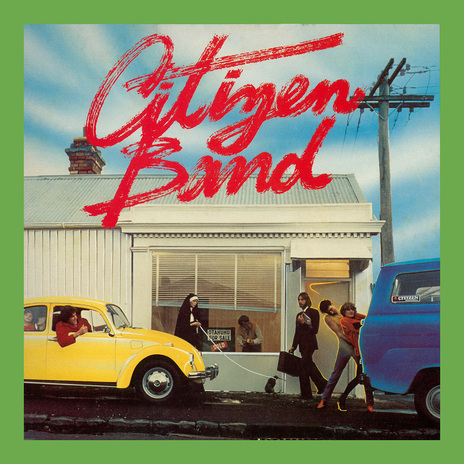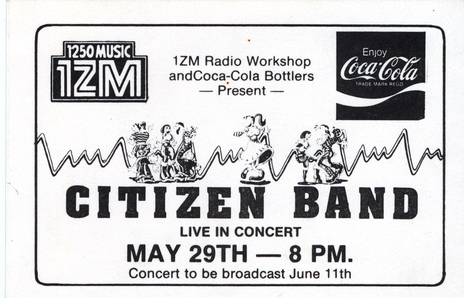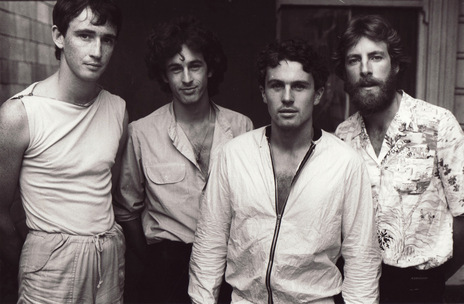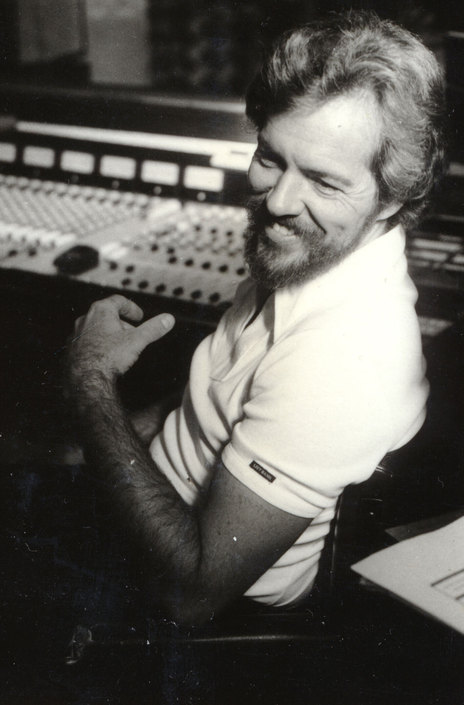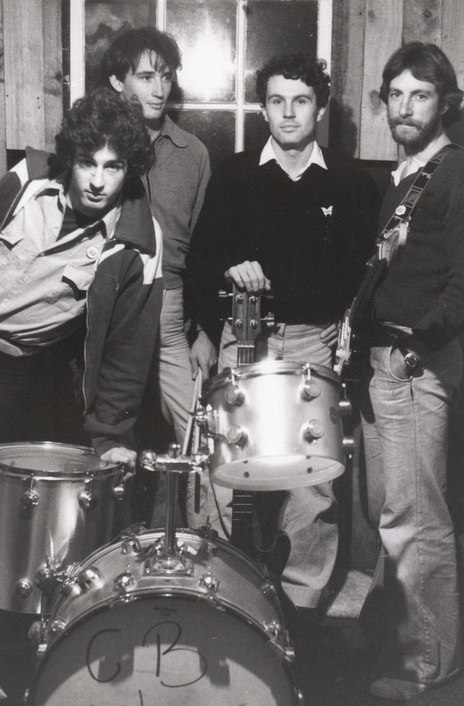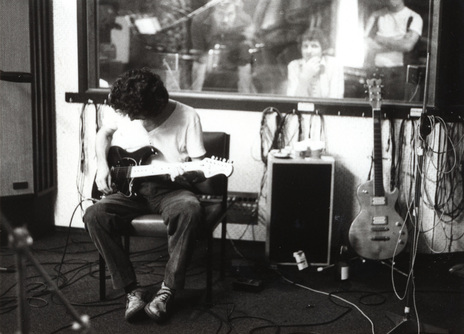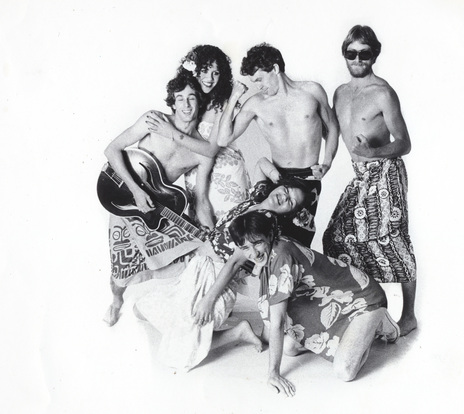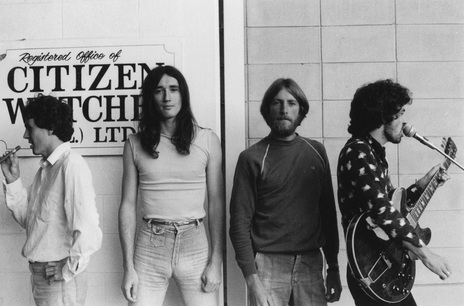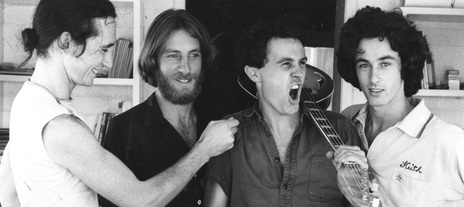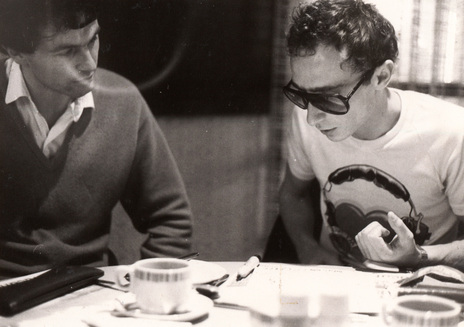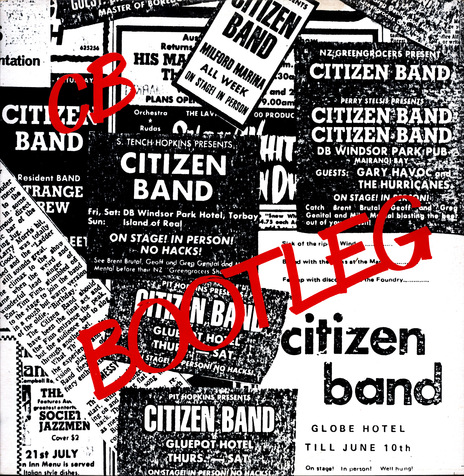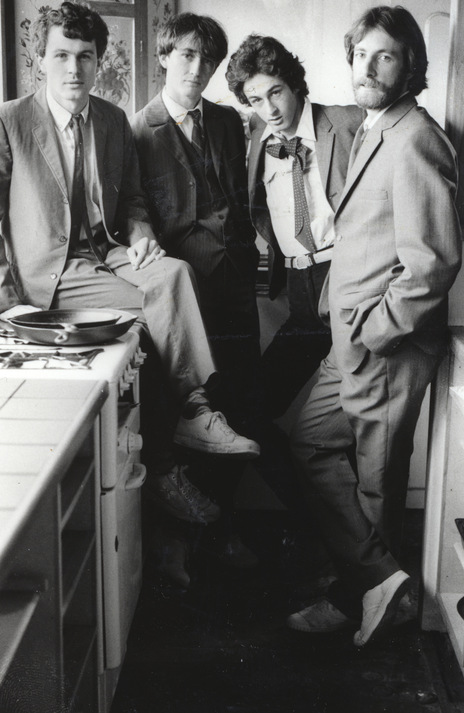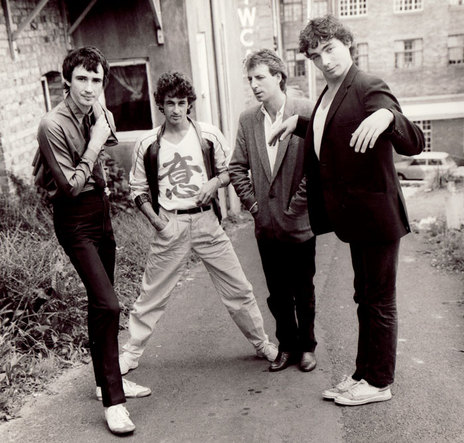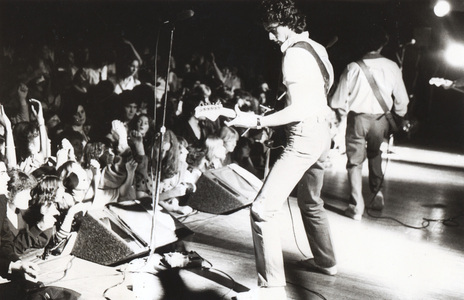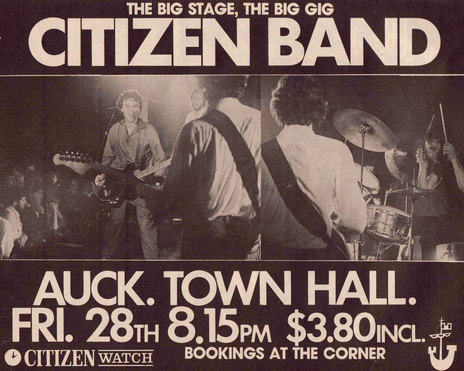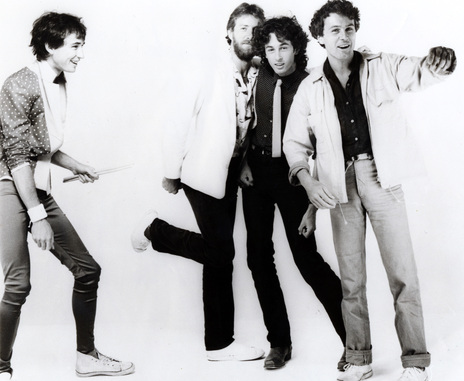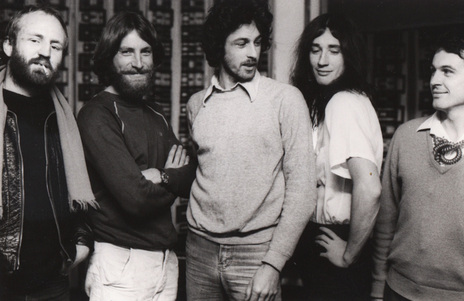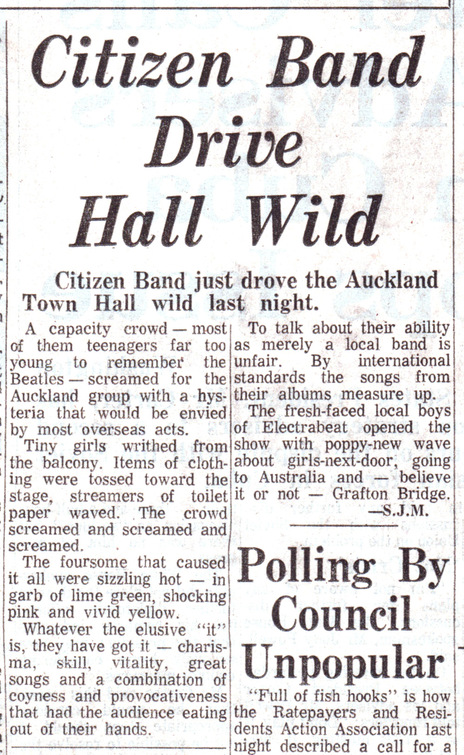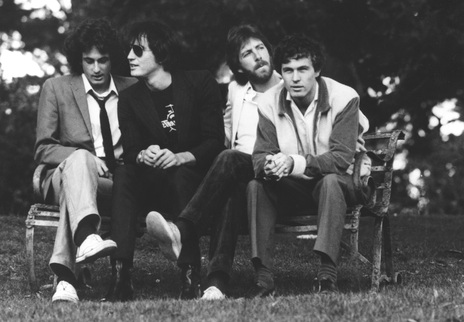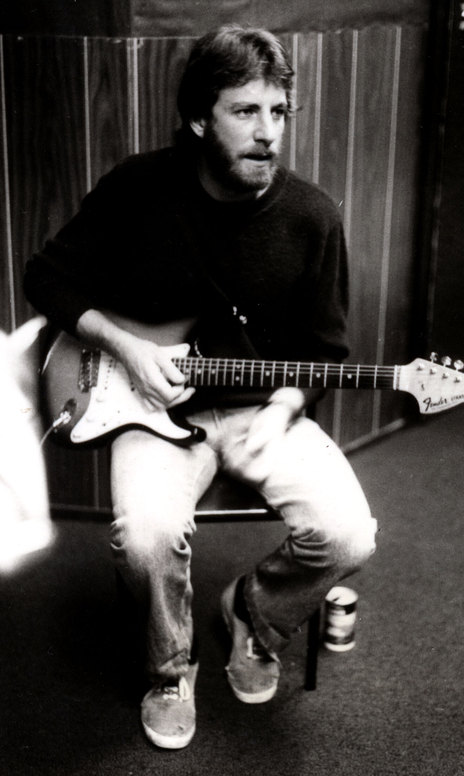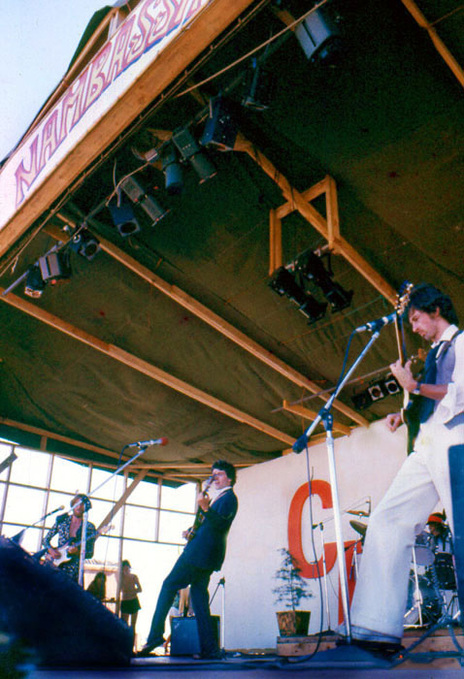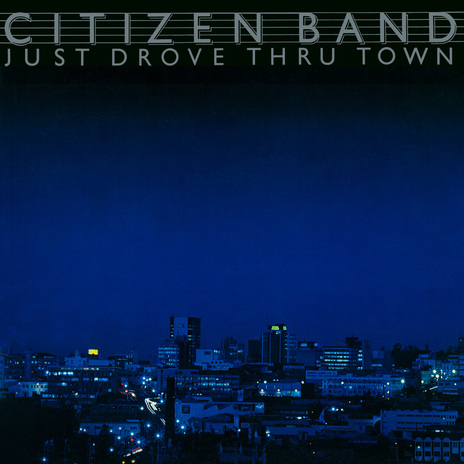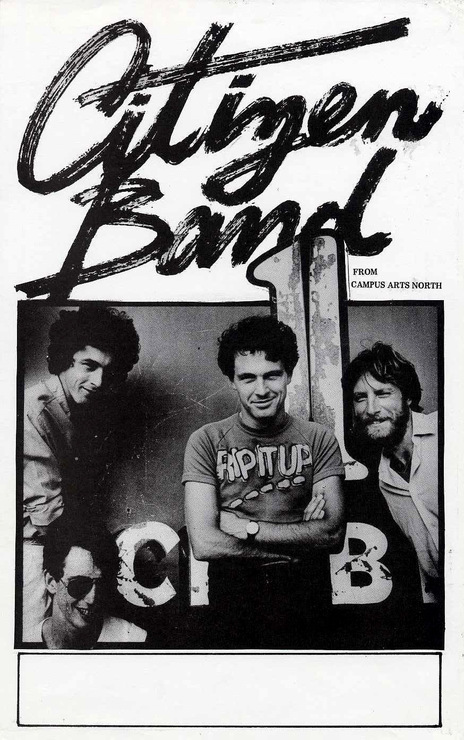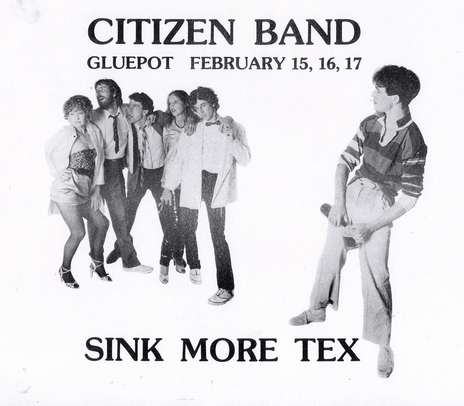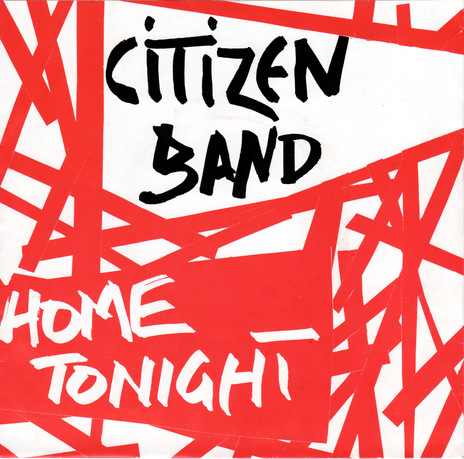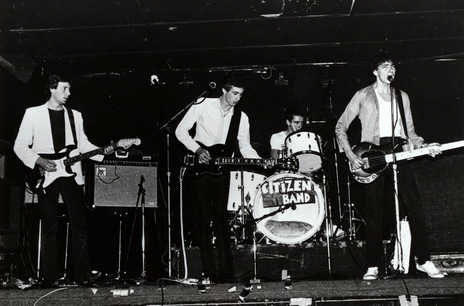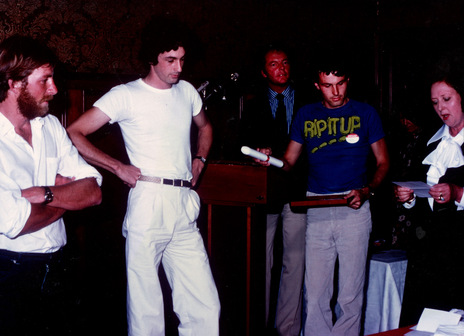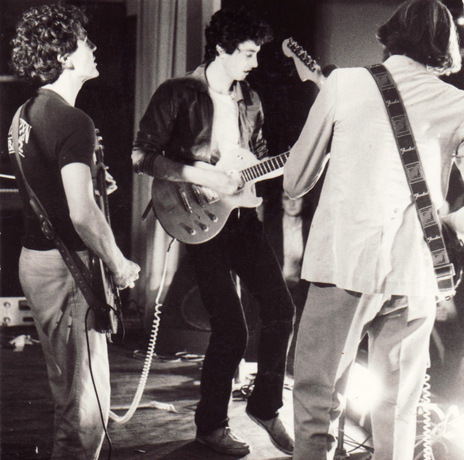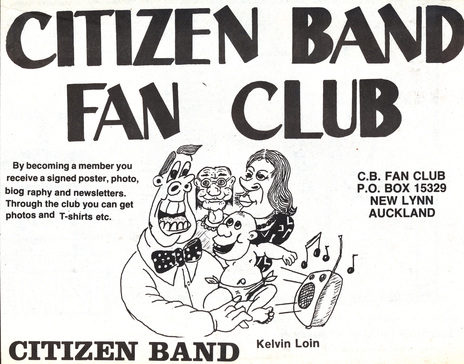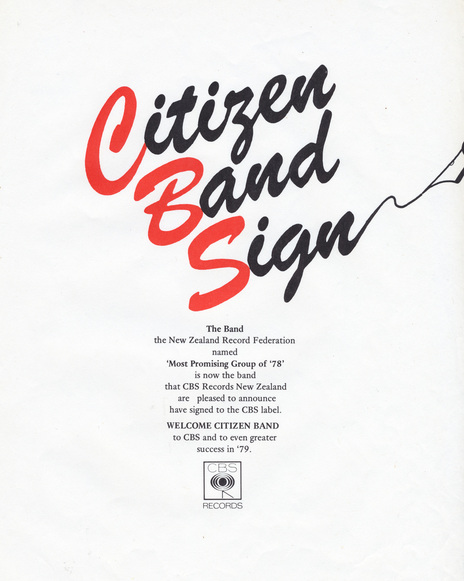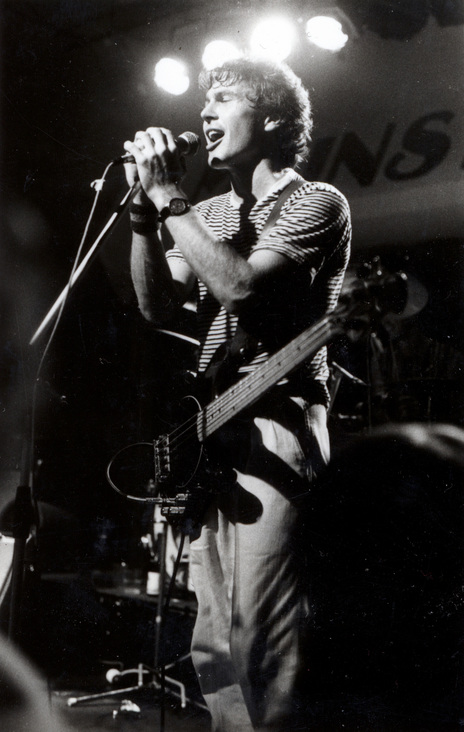When Split Enz bassist Mike Chunn returned from the UK in March 1977 to see his wife and baby son, he was also tasked with recruiting Alastair Riddell to replace Phil Judd. Riddell was not interested and “Plan B” was to consider Neil Finn. Mike went to see his brother Geoff and Neil Finn perform in their group After Hours and suggested to Tim Finn that he ask Neil to replace Phil Judd. Mike returned to London, having dismantled his younger brother Geoff’s band.
After Hours did their second and final gig at Auckland University’s Maidment Theatre on Thursday April 7, 1977. The following day, the 18-year-old Finn jetted off to London. Neil was “terribly excited, in a state of euphoria and organisation,” said Geoff Chunn in Chris Bourke’s 1997 book Crowded House: Something So Strong. As Neil was bound for London, Mike chose to leave Split Enz and return to Auckland.
The project’s working title was The CBs (The Chunn Brothers) but they adopted the more common use of that abbreviation, referring to the citizen band used by amateur radio transmitters.
Not surprisingly, Mike wanted to – and was obliged to – work with Geoff to create a new vehicle for his younger brother’s songwriting. The project’s working title was The CBs (The Chunn Brothers) but they adopted the more common use of that abbreviation, referring to the citizen band used by amateur radio transmitters.
As teenagers, Geoff played drums while Mike played bass. But from 1971 to 1973 Geoff played acoustic guitar in Rosewood with Graeme Gash and Kevin Wildman of Waves. The group’s biggest gig was The Great Ngāruawāhia Music Festival. Geoff returned to drums for Split Enz, from March 1973 to July 1974. He played on their first two singles, their appearances on the New Faces TV show and the first Radio Hauraki “Buck-a-Head” concert in April 1974.
Mike was in Split Enz from late 1972 to April 1977. He had a simple but unusual recipe for the new live band: “I had some songs I’d always wanted to play live such as ‘I Feel Good’ (Larry’s Rebels) and ‘Don’t Bring Me Down’ (The Pretty Things) and I thought these coupled with Geoff’s original compositions might make a good combination.”
Mike Chunn went looking for a record deal for the band, first approaching WEA boss Tim Murdoch, who was not interested. Mandrill Studio co-owner Glyn Tucker Jr was keen to record them using the studio’s recently acquired 16-track desk and Ampex 2-inch tape machine.
The earliest line-up of Citizen Band included songwriting collaborator Warren Sly on keyboards. An early acoustic showcase gig was not successful and Mike Chunn chased rock players Greg Clark and Brent Eccles, who joined in August 1977. Eccles knew the local live scene well, having also drummed in Street Talk and Voxpop and he worked with Clark and Alastair Riddell in Space Waltz and Stuart and The Belmonts.
The group’s first single ‘In A Lifetime’/ ‘Good Morning Citizen’ was released September 1977 on the studio’s Mandrill label. Further singles followed in 1978: Greg Clark’s composition ‘Somebody Else’ b/w ‘Holy Fulele’, the Larry’s Rebels’ cover ‘I Feel Good’ b/w ‘My Pohutakawa’ and the ‘The Ladder Song’ b/w ‘Martian Spaceman’.
Glyn Tucker spoke about the recording sessions in 2001: “I really enjoyed doing the Citizen Band albums, probably the first one the most, because that was our project and we didn’t really know what we were doing, including them. It was a cross between the new wave thing and songs that were more gentle and melodic.”
The band’s first live gigs with Clark on guitar and Eccles on drums were early October 1977 at the unlicensed Island of Real in Airedale Street – “once to a packed Sunday afternoon audience, once [mid-week] to six assorted family and the rubber plant.” (Rip It Up, November 1977)
The writer, Bruce Belsham, approved of the addition of Brent Eccles – “Geoff Chunn is at last given a rhythm section of class.”
Music writers used the old-fashioned term “beat group” to make reference to the 1960s British Invasion sound. In Rip It Up (March 1978) Francis Stark wrote: “It is still something of a shock to walk into a pub where Citizen Band are playing and hear a genuine beat group.”
When reviewing the Citizen Band’s debut album later in September 1978, Gordon Campbell wrote in the NZ Listener, “… Citizen Band work their own distinctive changes on the beat group era … The Chunns grew up in this era and the love affair enjoyed with it by all concerned is what makes the disc the sunny successful event it is.”
1978 started with big concerts for Citizen Band, performing at The Great Western Music Festival on January 15; The Nambassa Music Festival (Waihi) January 28-30; and the Riverhead Rock on Sunday February 12.
In 1978 Citizen Band were one of the key bands committed to playing original music on the pub circuit.
In 1978 Citizen Band were one of the key bands committed to playing original music on the pub circuit – playing central Auckland venues like The Globe, The Gluepot, The Windsor Castle and suburban hotels like The Milford Marina and Mairangi Bay’s The Windsor Park Hotel. Their newspaper adverts included such small print wit as “S. Tench Hopkins Presents” (a reference to the personal hygiene of former Split Enz manager John Hopkins), “On stage! In person! Well hung!” and taking the piss out of punk pseudonyms of the day with “See Brent Brutal, Geoff and Greg Genital and Mike Mental.”
As the manager of Citizen Band, Mike Chunn pioneered lunchtime high school concerts, found a helpful sponsor (Citizen watches) and tried to revive the 1960s with “Rock ‘n’ Roll Dances” at suburban halls. Late November and early December 1978 they played halls in Glenfield, St Heliers, Howick, Takapuna and Titirangi.
In the first week of September 1978, new wave rockers Graham Parker And The Rumour did a four-city tour and Citizen Band scored the support slot – taking their tunes to the town halls of Christchurch, Wellington and Auckland plus Dunedin’s Regent Theatre. At the end of the tour, in Auckland, Parker wrote down the lyrics and chords of his new song ‘Protection’ for Mike Chunn, so Citizen Band could perform the song. ‘Protection’ appeared on their second album.
Citizen Band’s debut album was released on the Mandrill label (via Phonogram) to coincide with the exposure achieved on the Graham Parker tour. Although Citizen Band had limited radio play, the Lower Hutt-based TVNZ music show Radio With Pictures would film touring bands as they passed through Wellington and Citizen Band appeared on RWP twice in September.
Reviews for their debut album were so over-the-top favourable that the members of the band risked having their own self-critical faculties killed by kindness. Citizen Band won the Most Promising Group Awards at the 1978 Phonographic Federation Music Awards. The band attracted the interest of CBS Records boss John McCready and the race would soon be on to write a second album.
Auckland was no longer a one-band town. A lot of groups were inspired by the success of Split Enz, Dragon and Hello Sailor, plus there was a new generation inspired by punk also knocking on venue doors. Recording contracts were hard to find but 1ZM Music Director Peter Fyers used Radio New Zealand’s 8-track studio to record local bands, including Citizen Band in the Radio Theatre in front of a live audience, for broadcast on Bryan Staff’s 1ZM evening show (1977-1981).
When Citizen Band and Th’ Dudes opened for Peter Frampton and Sherbet at Western Springs on November 22, 1978, it was Th’ Dudes that got the rave review from Rip It Up’s Duncan Campbell, writing in the December issue: “Th’ Dudes shone, and for me, were the highlight of the evening” and “It was not a good day for the CBs … me thinks Citizen Band are due for a well-earned rest.”
In the New Year of 1979, CBS announced the signing of Citizen Band to their select local roster.
In the New Year of 1979, CBS announced the signing of Citizen Band to their select local roster of Sharon O’Neill and Jon Stevens. To show the importance of the occasion, the company used a posh press release designed by a graphic artist.
When Rip It Up held its second birthday party in June 1979 at the new Liberty Stage venue in Symonds Street, Citizen Band played a set that included The Beatles’ ‘Birthday’, a song that became a regular tune in their live set.
In June 1979 Citizen Band recorded their second album at Mandrill Studios with USA producer Jay Lewis. In a press release when the album was released in August, Mike Chunn said, “Jay was intent on capturing the character of CB rather than imposing his own style. We loved him.”
“CBS have really looked after us,” Mike Chunn told writer John Dix. “The fridge is always well-stocked. We’re well fed. It makes two weeks in the studio a lot more bearable.” (Rip It Up July 1979)
The ultimate event in Citizen Band’s career was the Auckland Town Hall concert, Friday 28 September 1979, with tickets costing $3.80 inclusive of booking fee. (Ry Cooder tickets, two nights earlier at the same venue, were $9.75 inclusive of booking fee.)
“It was the last date of a national tour,” Brent Eccles told AudioCulture in 2014. “It was a gig CBS did not want us to do because they thought we would fail. The Town Hall manager told us that if kids got up to dance that they would shut us down because we didn’t have any experience in playing to a big crowd. We paid a Hauraki DJ to be the first one up dancing.”
I attended with 1ZM DJ Bryan Staff. We had good seats in the stalls but when the screaming of teenage girls became excessive, we sought refuge side-of-stage. The dancers so shook the aging wooden venue that the lightweight, modern Cerwin Vega PA stacks looked likely to topple into the audience. The road crew had to secure them and hold on tight!
At the time my review in Rip It Up (October 1979) read: “If the Town Hall is going to shake, what better way than to the sound of an NZ band. Even the P.A. was jumping up and down. Ropes and roadies were required to hold the stacks firmly on the stage. ”
“The lights went out, the recording of ‘Just Drove Thru Town’ boomed out, everybody started yelling and screaming. We were standing even before the band had even started. Two songs later (now standing on our seats) Bryan Staff (an experienced concert-goer) summed it up – (shouting) – ‘I’ve never seen a crowd like this before’.”
“The floor of the 70-year-old Auckland Town Hall could have collapsed last night under the strain of 2,000 stamping, rock concert fans."
Mayor Dove-Myer Robinson was not impressed. On the front page of the NZ Herald the following morning the headline read, WARNING AFTER CONCERT – “The floor of the 70-year-old Auckland Town Hall could have collapsed last night under the strain of 2,000 stamping, rock concert fans. Sir Dove-Myer Robinson said that the organisers had been warned that dancing in the aisles would not be allowed because of fire regulations.”
The review inside the NZ Herald was ecstatic: “Tiny girls writhed from the balcony. Items of clothing were tossed toward the stage, streamers of toilet paper waved. The crowd screamed and screamed and screamed. The foursome that caused it all were sizzling hot – in garb of lime green, shocking pink and vivid yellow. Whatever the exclusive ‘it’ is, they have got it – charisma, skill, vitality, great songs and a combination of coyness and provocativeness that had the audience eating out of their hands.”
The NZ Herald writer compared the scream-a-thon to the Beatles-era but despite playing to large audiences Citizen Band did not achieve significant radio airplay.
When Beatles copyists The Knack played Mainstreet on two nights in August 1979, we had already seen the 1960s-style white shirt and tie look a year earlier with Citizen Band gracing the cover of the September 1978 Rip It Up. Brent Eccles was in the Mainstreet mosh-pit and he must have thought Citizen Band’s day had come as The Knack’s power-pop topped world charts, but Citizen Band lacked a ‘My Sharona’. As Rip It Up Editor at the time, I thought the 1960s were back and was blown-away by The Knack. I took Barry Linton’s Devo illustration off the cover and replaced it with a shoddy Knack cover.
Citizen Band returned to the Auckland Town Hall to open for fellow-CBS rockers Cheap Trick – also outspoken fans of The Beatles – over three nights in October 1979.
In a story in the NZ Women’s Weekly (Nov 5, 1979) with the headline “Wives and children call the tune” Citizen Band speak of being daunted by the cost of moving their families to Australia. The story continues: “Then along came CBS Records with the offer of a loan and the boys jumped at the chance of being able to show their worth in the big musical smoke of Sydney.”
After the NZ tour, the band travelled to Sydney and CBS Records Australia released the album Just Drove Thru Town and the single ‘Rust In My Car’. The band scored support slots with groups including Dragon, Hello Sailor and Jo Jo Zep and the Falcons.
The group used the CBS-owned Waltham Recording Studio in North Sydney to rehearse new songs with titles such as ‘Home Tonight’, ‘Chinese Children’ and ‘Roo Bars’.
After a well-reviewed performance at the inaugural 1980 Sweetwaters Festival, Mike Chunn and Greg Clark quit the band.
After a well-reviewed performance at the inaugural 1980 Sweetwaters Festival, Mike Chunn and Greg Clark quit the band, prior to the band moving to Australia. On the Radio With Pictures Sweetwaters doco, Mike Chunn told Dylan Taite “I’m not getting anything out of being a band that’s touring a lot.” Mike would later attribute his leaving to Agoraphobia and describe that mental malfunction as being “fearful if you are away from a place you feel safe, Auckland. I had to leave [Split Enz and Citizen Band] because of that affliction.”
Rip It Up (March 1980) spoke to CBS Records boss John McCready: “Citizen Band is something of a sore point with McCready. He is disappointed about the departure of Michael Chunn and Greg Clark as he believes Australia might have been the band’s making. While he hopes that CB will continue with new personnel, ‘it will not be the same band.’ The members he points out were signed separately so any new contract must be renegotiated once a new band has been formed.”
The band returned to Australia in March 1980 with a new bassist Roland Killeen (ex Sheerlux) but no replacement for Greg Clark. The PR release states: “The recent addition of bass player Richard Killeen to Citizen Band has successfully dispelled any rumours of an imminent split.”
In April 1980, CBS released the “live” album CB Bootleg in New Zealand. CB Bootleg was recorded live in Mandrill Studio and the producer was "Lance Boil". With the band in Australia, their third long player had minimal promotion on the home-front.
Live albums can be excellent but when I reviewed the album for Rip It Up (May 1980) I was disappointed that the album was recorded in a studio. “Far more satisfying would be a live recording at one of the band’s Budokans: The Island Of Real, or Titirangi RSA Hall (or Auckland Town Hall). But such tapes do not exist. So here it is, the old CB line-up, as live as you’ll get it.”
The first Sydney gig for the three-piece line-up was April 5 at their local, The Mosman Hotel. The bar never had bands before Citizen Band, but they gained a residency on Mondays and Thursdays. With 150 patrons on a Thursday, the bar was packed and the August night that John Dix attended, they played two encores. Unable to find a new guitarist, they played as a three-piece until August, when Greg Clark flew to Sydney to rejoin the band.
Geoff Chunn told Rip It Up (September 1980), “We are only doing three old covers and eight or nine of our old songs.” They were performing new songs in Sydney included ‘Like Elvis’, ‘Modern Music’, ‘Do What You Dance’, ‘Rip Shit Or Bust’ and ‘Christ The Man’s A Wonder’. The band shared the songwriting and Killeen sung some lead vocals.
Citizen Band were now performing up to six times a week in smaller Sydney venues such as the Astra (Bondi), the Strata (North Sydney) and French’s Wine Bar (Darlinghurst). I wrote in Rip It Up at the time, “they’re free of the big circuit expenses, debts and fame.”
On their relationship with their record company, Geoff said, “there’s no disharmony between CBS and ourselves, but we don’t know what they are thinking and they do not know what we are doing.”
The group returned for a 30-date New Zealand tour from October 15 to November 16 and a three song EP was released. The A-side was ‘Home Tonight’ and the flip ‘Pyjamas’ and ‘I Want To Be Happy (She’s The One)’.
The February 1981 Rip It Up reported that Roland Killeen had left the band and that Tim Lumsdaine from D.Minor & The Dischords had replaced him on bass. The Australia news column in the April Rip It Up reported that, “As the rehearsals with their new bass player didn’t work out, Citizen Band have disbanded.”
In March drummer Brent Eccles had successfully auditioned for The Angels and he completed two weeks of rehearsals by the time it was announced that Citizen Band had split.
When former CBS Records boss John McCready spoke to AudioCulture in 2014, he reflected on Citizen Band: “We never broke through like I thought they should have broken through. They had ‘Rust In My Car’ which got played a bit on the radio, but they never were a singles band. They never had catchy songs like Dave Dobbyn, they were more of an album band. We never got that message across and we never got much radio play. They had all the potential to be a big band. They had good songs.”
